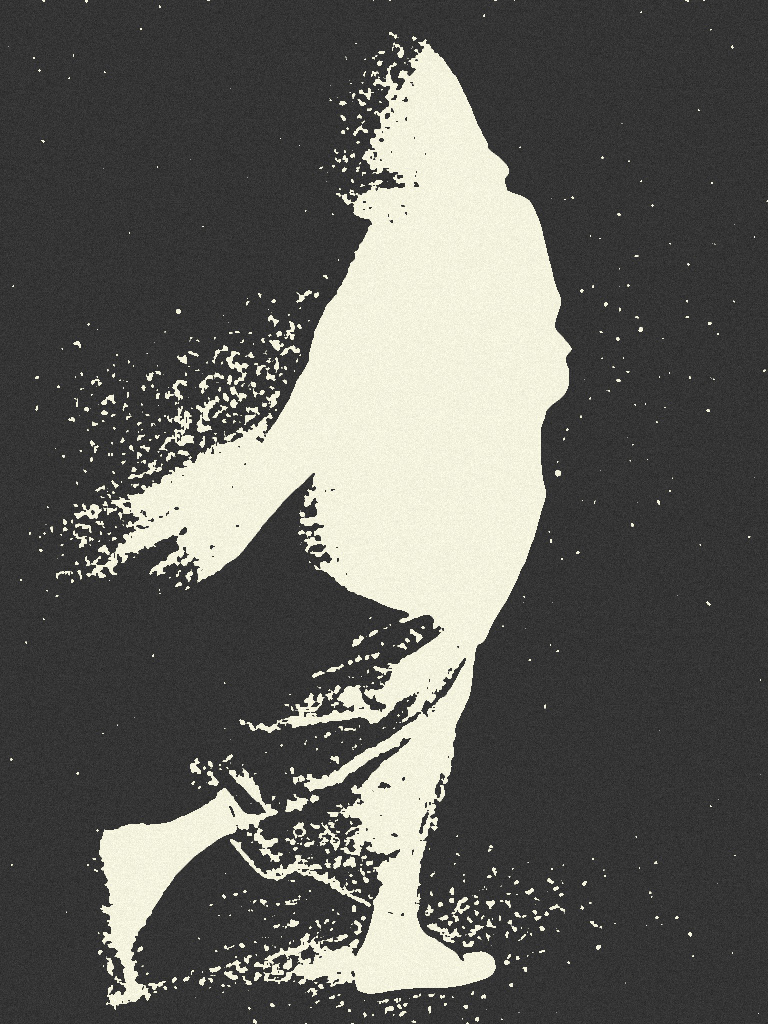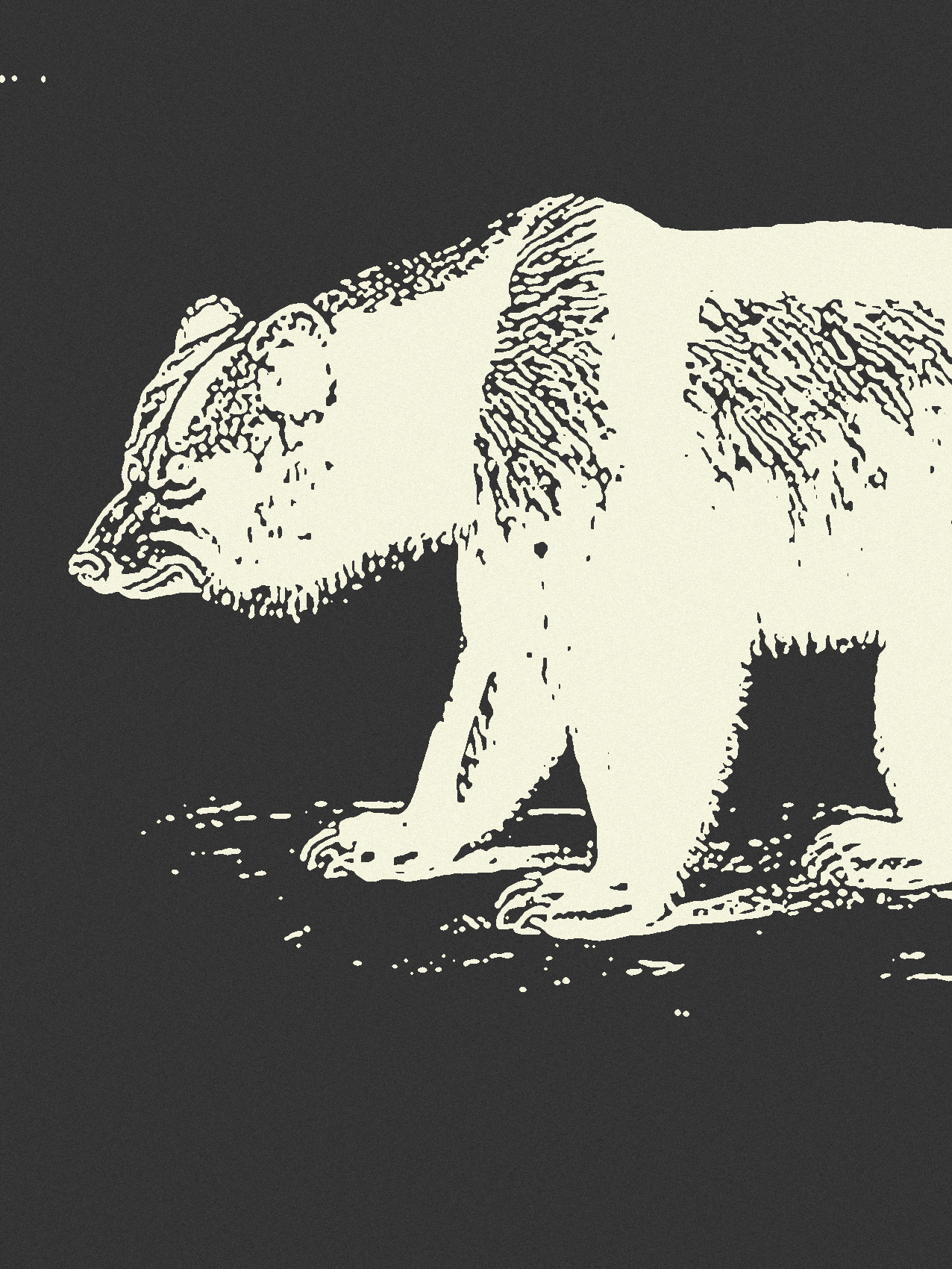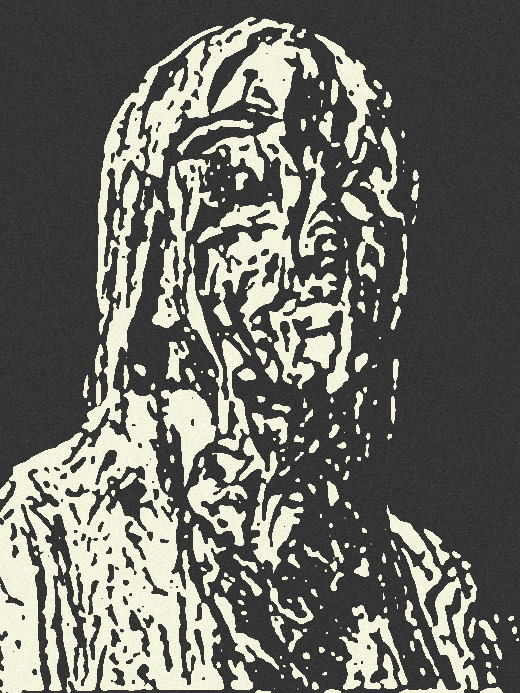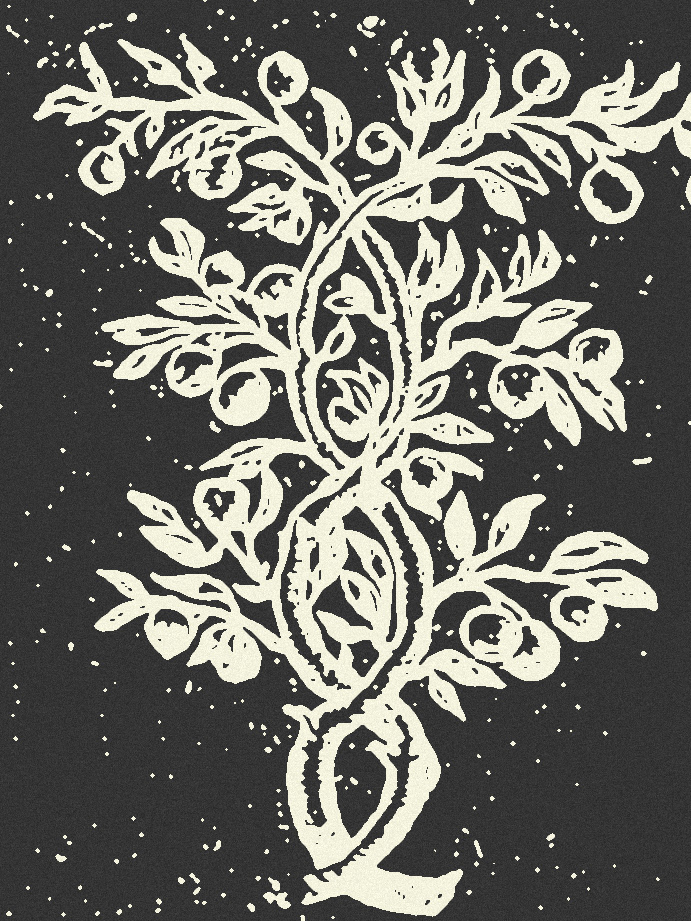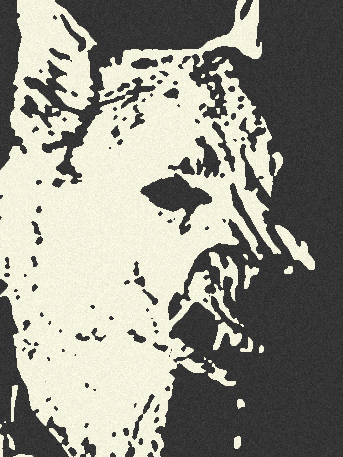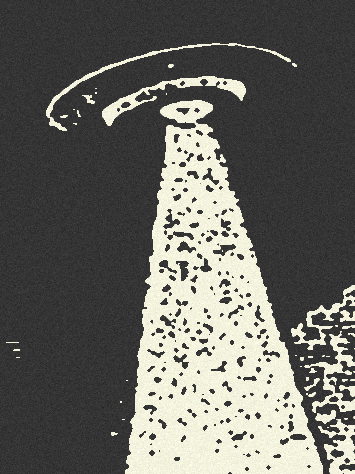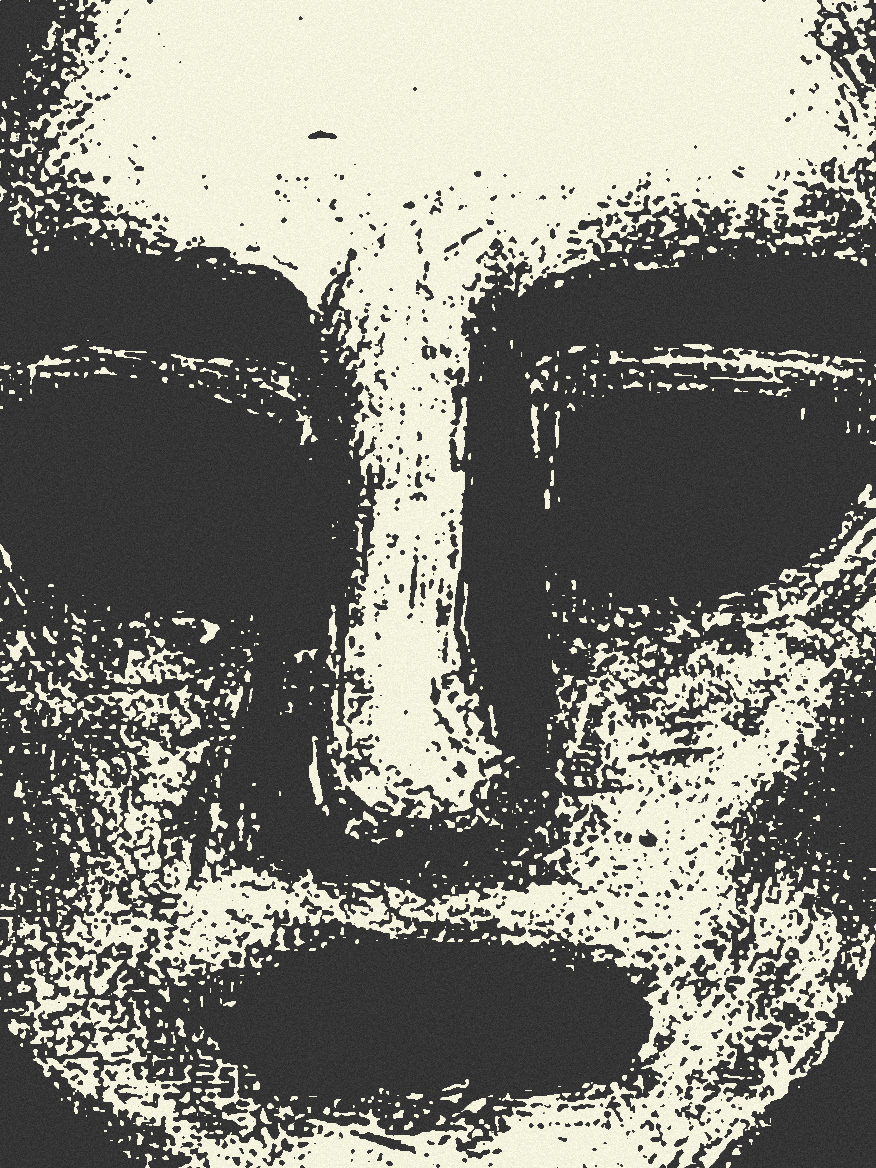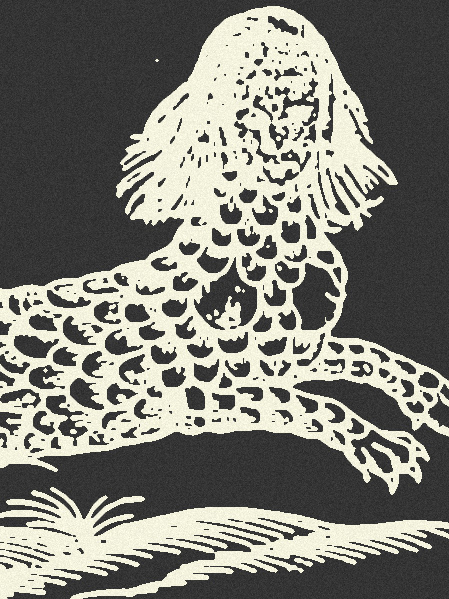✷
I sit beside sorrow heading crosstown, eyes straining for the address through iridescent drops that pelt the windshield. I depart the bus and climb the steps of a brownstone. A woman answers the door. She wears a black, avian print dress that conforms to her svelte body. Where have I seen her before? Perhaps she is the doctor as she extends her hand in cordial expectation. Her pale skin is warm and soft, her scent pleasant, like delicate incense. Her wedding band is simple but elegant, like the one I chose for my beloved. Without uttering a word, her presence reassures me.
Then, a dreadful notion. What if she is a hallucination, can I trust her—can I trust myself? We take our seats in her oaken office. I watch her input data into a laptop. Keystrokes flutter like a startled flock of birds taking flight from her dress.
There is a village not found on any map, doctor. Its streets intersect like human limbs writhen in aberrant shapes, nearly impossible to traverse in the constant melancholy of inclement weather. Raindrops beat loud, frantic rhythms like unborn hearts, cascading onto sunken gardens. Ivy chokes stone walls. Beyond the windows, vapors dance wildly, perhaps lost spirits or the smoke of an oven in search of a chimney. Those who dwell there seem forged in mist and vanish at the first sign of desire.
Stefan, you say this place does not exist yet describe it as if you have been there many times.
It is not found on any map is what I said. I’ve never lived there nor recall visiting in real life. With no forewarning, I stand in front of the same dreary house.
Your narrative lacks sense. Perhaps it is a dreamscape, designed to instill fear or remorse. Dreams present us with enigmatic settings at the expense of everything else. A strange or familiar person might enter the dream just to stoke interest.
Yes, that’s what happens.
Such reveries provide an impressionable mood but no resolution, she says. When did these episodes begin?
Forty years ago.
The doctor exhibits no surprise as if she has experienced my suffering. Another flock of birds scatters off her dress.
Continue, she says.
I arrive in the village around twilight. Every sensation, nuance, each word is a facsimile of the previous day. Beads of sweat—or maybe salty raindrops—cover me as if I were plunged into a realm of otherworldly tears. Beneath the arching canopy of a chestnut tree, a voice whispers: Come along. We enter a gabled house illuminated by frosted moonlight. I feel insecure as the wooden stairs bend under my weight. The only support is the cold hand of a little girl holding my wrist.
Don’t be afraid, she says. Only monsters are.
The child seems pleased yet suspicious of my arrival. Her flaxen hair hangs in ringlets, her face sallow with almond eyes innocent of nature’s indifference toward ruin. Her arms and legs are marred with lacerations—ribbons of flesh healed into jagged scars. She is dressed in the shades of her wounds, from her turquoise barrettes and gentian flowered jumper to her navy buttoned shoes of a different era.
Come into the nursery, she says. I will introduce you to my friends.
We enter a room. Rusty hinges strain to hold the door to its frame. The wooden floor buckles beneath walls that sob in uneven breaths.
Ah, my lovely mirror, says the little girl. You are broken, but that’s okay. And you, unpredictable table. You have only three legs, but I love you all the same.
I pity the lonely child and offer to replace her flawed possessions, removing my wallet and placing several bills on the unsteady table.
With this money, she says, I’ll buy food to last the winter. Don’t be sad while I’m away. My diary is on the table if you care to read it. Goodbye for now.
Before I can stop her, she is gone. Loneliness strikes as if I lost part of myself. I open the book but the pages are blank—nothing left but the sad company of raindrops flitting across the window pane. And then, the creaking stairway announces her return. Her arms surround a box of pastries and a small sack hangs from her shoulder.
I don’t like the look on your face, she says. You think me foolish.
She sets the box down and empties the sack of chestnuts onto a platter, then arranges them in rows like toy blocks and places the lot on a grid in an open oven.
I know what you are thinking, she says. There are enough of them to keep me out of trouble. With a slight tilt of her head, she peeks into the box of pastries, then closes her eyes and reaches in. She wraps her lips around a praline.
Little monsters, she calls the chestnuts as they dance upon the heat. You depend on me for everything. She removes the pan and bites the stubborn ones whose skin refuses to burst. Now be happy and make no complaints, she chides. With little regard for my company, she skips to the far side of the room and climbs upon a stool. In the dim light, she holds an embroidery frame and begins stitching.
My work is worth something. Mother would agree.
Where is your mother?
She is off helping others. Still, she is near.
Who takes care of you?
Don’t be silly. I do.
The child is too young to bear such responsibilities. In my consternation, I tap on the broken table, entraining the sound of raindrops striking the roof. She grips her chest, distressed by my restless fingers. I stop.
One heart cannot beat as two, she says. I’m all right now.
My eyes fix on her thin legs.
You’re staring at my scars!
No child deserves them.
Can I tell you a secret?
Certainly, you can trust me.
Once, I wandered into The Blue Country. I say blue because it is the color of all things that die. I fell asleep and awoke to find these cuts on my limbs.
Color can’t harm you—certainly not blue. It sits at the center of a rainbow.
I’ve never seen a rainbow. There is no sky in The Blue Country.
Rainbows need sunlight to reveal their beauty. You won’t find them here, either.
Disheartened, the child lowers her head.
Do you have other friends besides the mirror and table? I ask.
Oh, yes. There is a little boy. Come out, come out you troublemaker. Don’t be afraid, she alerts me. He can be a monster.
How can a child be such a thing? I say.
I saw him lying beneath a tree in The Blue Country. He, too, wandered into that land. We found our way back to the village, but all who visit there must return. It won’t be long until I must go.
I’ll be very sad if you do, I say. Come away with me.
Does the child show any desire to leave? asks the doctor.
She never says. Please, let me continue.
A misshapen runt appears at the door. The boy is frail and hunched over, lacking distinct features—somehow incomplete. Shyly he approaches, peeling fruit and tossing the rinds carelessly about.
Pick them up, she shouts. How dare you dirty my place?
She unbuttons a shoe and throws it at him. The boy sticks out his tongue, giggles, and scampers away.
He likes you even though you treat him harshly, I say.
It’s all pretend. He’s not real.
But, I saw him.
Her behavior and puzzling words confuse me, yet my fondness for the child grows. I ask if we might meet again.
You monster, she says, staring at my reflection in her broken mirror. You must come back before it is too late.
Tears run down my cheeks. The doctor reaches for a tissue but wipes her eyes, then asks if I am strong enough to go on.
My time is not up. Let me finish.
In the ensuing days, I glean nothing more of the girl’s life. I beg the child to leave the house and come with me. No, no, she insists. Too late for that.
The winter nears its end yet dark clouds hover and the rain turns colder. I plan to snatch her from the village. On my next visit, I enter the house but she is missing. My plan is doomed. I sit at her wobbly table which suddenly collapses, sending her diary tumbling onto my lap. Each page is empty except for the last.
Dear Papa. You are not a monster. Goodbye. I’ve gone to The Blue Country.
That is everything, doctor—down to the last detail. Help me find her before it is too late.
The doctor stands. It is too late, she bluntly states. These episodes pose an unresolvable conflict between obsession and closure. Your addiction to life’s greatest sorrow has gone untreated far too long and turned you into a prisoner of grief. But you know this. You should have come to me long ago.
I sink into my chair from the weight of regret.
The doctor closes her laptop and the last bevy of birds flies from her dress.
The child is lost, she says. Resurrection is not an option. I cannot offer relief when none exists, other than the warmth of my body and the touch of my lips.
What kind of doctor are you?
One who knows suffering equal to yours.
Though I am not a violent person, I lunge and shake her. Help me!
Stop this instant. Neither of us is immune to such sorrow. Accept hopelessness.
The doctor is frustrated. The moonlight in her eyes waxes and wanes. She taps on the laptop to the rhythm of the falling rain. With each stroke of her finger, I come to understand my situation. I have lived in the village for forty years and so has the doctor. Though I seek her help, I must no longer discharge my burden on her.
The pendulum on the clock stops. Your time is up, it says.
The doctor tilts her head, not unlike the little girl.
Concerning the dire nature of your plight.
Yes, doctor?
The child cannot return, but what prevents you from accompanying her? The doctor directs my eyes toward a nearby table. There, Stefan, is a one-way ticket to The Blue Country. Many times, I thought of using it myself, she says.
Oh, doctor. I thought you didn’t care.
Nonsense. I care as much as you.
I approach the desk, take the ticket, and place it against my temple. Suddenly, the good doctor rushes toward me and grabs my arm, then seals her lips to mine, igniting a happiness known only before the years of heartbreak.
I can’t let you go, she says.
It’s the only way into The Blue Country.
She removes the ticket from my hand.
We suffer the same affliction. Let her go, Stefan. Our child is at peace. She demanded your devotion yet departed alone. I cannot bear to lose you, too.
The birds return and circle above, then perch again on the good doctor’s dress. Their fluttering lifts the edges of travail and releases a calm that, for the moment, shrouds persistent sorrow.
✷
Stephen Myer is a writer and musician in Southern California. His stories and poetry have been published in Tales from the Moonlit Path, Hidden Peak Press, Roi Faineant Press, Grand Little Things, JayHenge Publishing Back Forty Anthology, Figwort Journal, The Avenue Journal, Close To The Bone, A Thin Slice of Anxiety, Blood Fiction vol. 2, and elsewhere.

